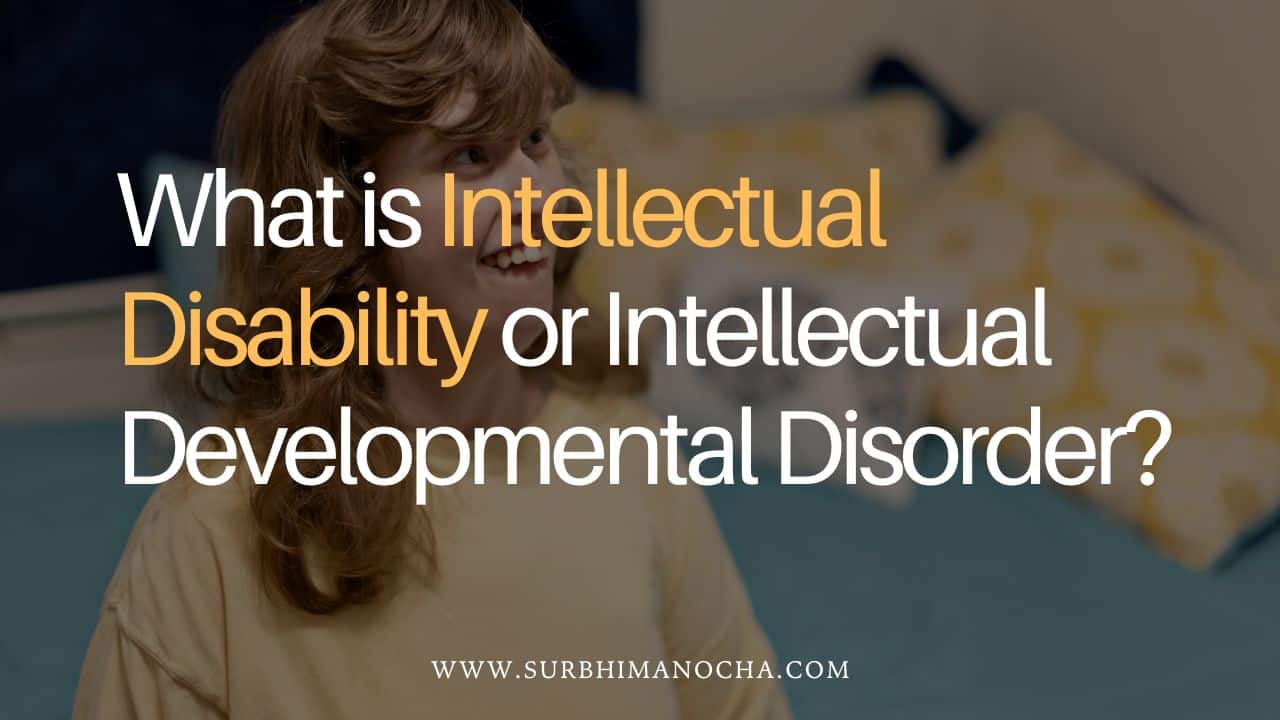Home » What is Intellectual Disability or Intellectual Developmental Disorder?
What is Intellectual Disability or Intellectual Developmental Disorder?

Intellectual Disability (I.D.), also known as Intellectual Developmental Disorder, is a disorder that typically emerges during the developmental period and involves deficits in both intellectual and adaptive functioning across various domains. This disorder encompasses deficits in cognitive abilities like reasoning and problem-solving, as well as difficulties in meeting personal, practical and social expectations.
Without consistent support, these deficits impede an individual’s ability to independently perform everyday tasks (activities of daily living) and engage in social interactions across different settings. Essentially, it indicates below-average intelligence (less than average I.Q.) and significant delays in reaching developmental milestones across various domains of development such as cognitive, motor, social, emotional, and speech & language development.
The first characteristic criteria for the diagnosis of Intellectual Disability (I.D.) is the deficits in general mental or cognitive abilities such as reasoning, problem solving, planning, abstract thinking, judgment, learning from instruction and experience, and practical understanding. Reasoning involves logical thinking and informed decision-making, while problem-solving entails identifying and addressing challenges of life.
Planning consists of organizing tasks and setting objectives, and abstract thinking involves grasping complex concepts. Judgment involves accurately evaluating situations, while learning from experience involves gaining insights and adapting behavior based on past encounters. So a child with intellectual disability will exhibit behaviors not in line with his age. He will face challenges in remembering and recalling tasks & academic work, taking independent decisions, remembering and recognizing routes, understanding the concept of money and time etc.
Another major characteristic criteria for the diagnosis of Intellectual Disability (I.D.) is the lags in adaptive functioning. These deficits pose challenges in daily tasks that provide personal independence. It includes challenges in toileting, bathing, grooming and dressing, and eating skills, household and kitchen chores, etc. across different settings (home, school, and community).
The child with intellectual disability will face difficulty in acquiring age-appropriate skill-set. For example, an 8-year-old child may still face challenges in tasks such as eating independently with fork and spoon or using a knife for basic chopping. They may lack competence in dressing themselves independently and struggle with tasks like buttoning or tying shoelaces. Additionally, they may have trouble recognizing currency and performing basic age-appropriate calculations. Learning to communicate effectively and age-appropriately shall also remain a challenge for a child with Intellectual Disability.
When a child exhibits delays in reaching developmental milestones, it’s crucial to conduct a comprehensive assessment by a mental health professional or child counselor / psychologist. This evaluation takes into account the Case History of the child which includes presenting concerns, history of pregnancy & developmental milestones, child’s adaptive behavior, medical history etc; IQ test; questionnaire on adaptive and social behavior; observation during play sessions etc. Early assessment and diagnosis enables mental health professionals and therapists to implement targeted interventions tailored to the individual’s specific requirements.
Understanding the severity of intellectual disability, i.e., the child’s IQ level (borderline, mild, moderate, severe, profound) becomes important as it underlines the necessity for continuous therapeutic support and intervention accordingly.
The various therapeutic services include occupational therapy, special education, and speech therapy (if required). Occupational therapy is aimed at improving gross and fine motor skills of an individual which ultimately increases independence in activities of daily living. It also addresses sensory-motor difficulties if any. It further helps in improving executive functions of any individual.
As the name suggests, special education is designed to improve educational performance of children with special needs. By addressing these limitations early on and providing personalized interventions, individuals can receive the necessary assistance in developing basic skills and abilities, thereby optimizing their overall functioning and enhancing their quality of life.
If you observe signs of delayed development in your child, it’s recommended to seek advice from a licensed child counselor or child psychologist for an early assessment. This allows for timely therapeutic interventions to be implemented.
If you’re seeking assessment and diagnostic services in Meerut, you can reach out to Ms. Surbhi Manocha, a licensed child counselor / child psychologist. Assessment sessions are conducted in-person at the clinic and presence of both parents (if possible) and child is necessary. To schedule your appointment, call: +91 8923270266 or 8266895667.
Expand Your Horizons:
Browse Our Other Informative Reads
Get Started Booking Your Appointment is
Just a Click Away
-
Select Location
-
Select booking
-
Select Service
-
Select Date & Time
-
Enter Information
-
Payment Method
-
Verify Order Details
-
Confirmation
